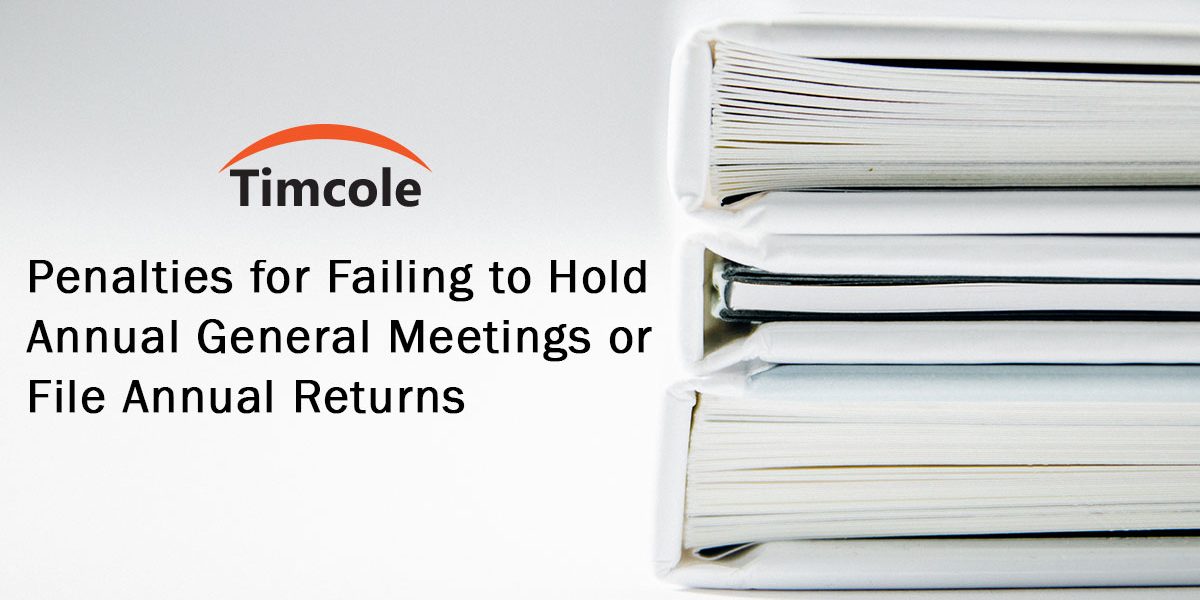Penalties for Failing to Hold Annual General Meetings or File Annual Returns
The Accounting and Corporate Regulatory Authority (ACRA) is Singapore’s watchdog for companies operating in the country. Among other tasks, ACRA monitors whether they hold the annual general meetings and file their annual returns in time. It also has the authority to punish and penalize companies that do not comply with the law.
The Law
Under section 197(1)(b) of the Singapore Company Act, ACRA mandates that all companies that are incorporated locally should hold their first AGMs within 18 months of incorporations. It further mandates that all AGMs held thereafter should be held within one calendar year and within 15 months of each other. Furthermore, the companies are required to file their annual returns to ACRA within one month after the AGM.
This law is meant to protect all stakeholders within the company. The AGM gives stakeholders an opportunity to hold directors to task and voice their views. The annual returns, on the other hand, provide important financial information critical to the stakeholders’ decisions; it also helps flag any inappropriate conduct that may be considered illegal or unethical.
 Leave the administrative filing to the professionals.
Leave the administrative filing to the professionals.
Timcole offers affordable GST filing, corporate tax filing and other accounting services to all businesses.
Contact us today to learn more on how we can help in lessening your administrative burden.
Penalties for Breaking the Law
If, for any reason, a company should fail to hold AGMs and file its annual returns as mandated, ACRA will penalize it. Penalization is a three-stage process that gets severe with each stage. The idea is to approach the company with a considerate attitude to prompt it to do as mandated. If, however, this fails, then ACRA ups the stakes and eventually forces the company to comply. Additionally, the company’s director is required to show up to court and answer to the summons, in addition to other penalties.
Here is a breakdown of the three-stage process:
1. Stage One
The first penalty is for late lodgment. It is relatively lenient. This penalty may be filed for any of the following three breaches:
- Failure to hold the AGM within the set time frame
- Failure to file the annual returns within the set time frame
- Failure to update the accounts laid out at the AGM
As mentioned, this penalty is fairly lenient. Instead of prosecution, companies choose to incur fines of $300 for every breach listed on the penalty. Companies are also issued with a late lodgment fee of an unspecified amount under both options.
2. Stage Two
Supposing the company fails to settle for the first late lodgment penalty and incur the cash fine, ACRA issues a harsher penalty. In this case, ACRA offers companies a choice between prosecution or steeper fines. Again, companies may be penalized for any of the three aforementioned breaches of conduct. Fines are raised from $300 to $600 per breach.
3. Stage Three
If both of the first penalties go unanswered, ACRA steps in with an ultimatum: arrest or compliance. In some cases, ACRA may carry out both penalties. A warrant of arrest is issued against the company’s director(s), and each breach can incur a fine of $900, triple the initial amount.
The Other Option: Review
It is common for companies to fail to comply with the law due to uncontrollable circumstances. In this case, such companies have an opportunity to present their cases to ACRA for a formal review. Reviews can be geared towards eliminating or reducing all penalties and fines, including summons, late lodgment fees, and composition fees.
The company’s director has to set up an appointment with ACRA officials for the review. There is no set time frame within which companies can have a sit-down with ACRA. Each request for a review is weighed against the case’s complexity, and replies may take anywhere between one and eight weeks; or even longer for special cases. The outcome for each review is never guaranteed, so it is prudent to either fortify your case or honor the summons and penalties.
Consequences for Directors
Directors take the heat of the law for their companies’ failure to comply with the law or honor summons and penalties. Personally, directors have something to lose.
First, a director faces legal liability for defaulting on the Singapore Companies Act. This includes, among other things, failing to ensure that his/her company holds the AGMs within the stipulated time frame, and failing to file the company’s tax returns in time. In this case, the director risks being debarred if he/she continues defaulting for three or more consecutive months. In this case, the director will be required to relinquish his/her position in the company. The debarred director will also be barred from holding any similar positions in other companies.
ACRA has also issued a new mandate seeking to get greater control over directors who do not comply with the Singapore Companies Act. Under the new mandate, any director who has three or more of his/her companies struck off within a period of five years stands to be debarred, at least temporarily. In this case, the director cannot hold any managerial position in any company for a period of five years since the time when the third company was struck off. However, this mandate is only applicable where the striking off was initiated by ACRA.
 Company directors play an important role in a Singapore incorporated business.
Company directors play an important role in a Singapore incorporated business.
Click to learn more on the requirements and roles of a Singapore director.
Staying Compliant
It is prudent not to get on the wrong side of the law. In spite of what people say about Singapore being friendly to businesses, the authorities are strict on enforcing the law. And, considering how much reputation matters here, it is important to avoid scrutiny as much as possible. This is why every company should strive to stay compliant with the Singapore Companies Act. The Act is broad, and it mandates more than annual GMs and financial returns. If necessary, the company should hire professionals who are intricately familiar with the law to ensure compliance.
Final Word
Singapore is one of the friendliest places you can set up a business. It is also one of the most lucrative. However, it is also strict on its laws. For companies who fail to hold their annual general meetings and file their financial returns in time, these are the penalties to look forward to. Remember, however, that the Singapore Companies Act is broader than this.
About Timcole
Timcole is one of the leading company incorporation and accounting firm based in Singapore. Our wide range of professional services serve as a one-stop solution for your business, offering you the most affordable price for services conducted with the highest level of excellency.
Contact us to find out more on how we can help you with your company today.








